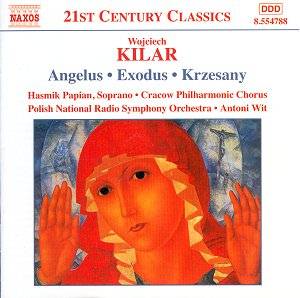Arguably, Wojciech Kilarís greatest successes have
been in the field of film music, notably his score for Francis Ford
Coppolaís movie Bram Stokerís Dracula. Yet his early career saw
him very much at the heart of the Polish avant-garde school, alongside
his close contemporaries Penderecki and Górecki. Like his contemporaries
he presented his early avant-garde works at the first Warsaw Autumn
Festival, also attending the Darmstadt Summer School in 1957 and studying
with Nadia Boulanger in Paris. Again, like his contemporaries, his works
from the 1970ís onwards have rejected atonality, concerning themselves
with a newfound simplicity and directness of expression.
Where his work has perhaps always differed from his
colleagues is in his fascination for Polish folk music and traditional
sources. It is clearly in evidence in the earliest work on the disc,
Krzesany, dating from 1974. Inspired by the Polish mountains
the work opens with densely rich, resonant string chords that immediately
bring to mind Górecki. Kilar soon ploughs his own path however,
the music moving through a sequence of passages, some contemplative,
some, as in the first return of the opening chords, now blazing with
brass accompaniment. The folk element can be heard at several points
in the work but none so clearly as at 6í43" where an earthy, stamping,
peasant like dance reminiscent of Bartók takes hold, eventually
transforming itself into a passage of rushing dissonant semi-quavers
in rhythmic unison, the harmony becoming progressively tougher and a
clear reminder of the composerís avant-garde roots. The work closes
in a wild folk dance induced riot, the music becoming ever more multi-layered
and out of control before a long, slow brass crescendo brings the party
to a very abrupt halt.
Angelus shows a very different side of Kilarís
musical nature, forming a setting of the Ave Maria text on a grand scale.
The work opens with mysterious spoken recitations alternating between
male and female voices, gradually building over three and a half minutes
until the orchestra joins in a huge climax, the choir shouting the name
of Jesus repeatedly. The music subsides into a rapt oration for solo
soprano over strings and chorus (again echoes of Górecki here),
movingly beautiful in its simplicity. The accompanying textures grow
richer until a further climax is reached following which the solo soprano
returns, this time supported by the chorus over a slowly treading orchestral
accompaniment that ultimately brings the work to a peaceful and satisfying
resolution.
In his booklet note Richard Whitehouse describes Exodus
as Kilarís Boléro and it is not difficult to hear why.
Strikingly imaginative in its use of orchestral resources the entire
work revolves around the haunting clarinet melody heard at the outset,
like the Ravel, generating a huge, slow crescendo and subjecting the
theme to a multitude of instrumental transformations whilst never deviating
from its original melodic form. It is not until late in the work after
a brass led, martial like climax that there is a change in the momentum,
the choir entering with rapid biblical exclamations before the word
Domine is repeated with increasing intensity, over the top of
which trumpets reintroduce the original theme. The choir then take up
the theme and drive the work to a triumphant conclusion.
At a little over three and a half minutes Victoria
is by far the briefest work on the disc, being in many ways a condensation
of the process used in Exodus and very recognisably the work
of the same composer. Opening with a bold orchestral gesture the choir
enter with martial like precision, as Richard Whitehouse points out
not unlike Orff, but perhaps more tellingly initially reminiscent of
a Jerry Goldsmith film score. The mood soon changes to one of celebration
and this highly attractive little ode concludes resolutely and emphatically.
There may not be the greatest degree of originality
in Kilarís music but without exception these works are attractive, colourful,
accessible and, as you would expect for a composer with a track record
in film music, scored with impressive variety and skill. Anyone with
a liking for the later works of Górecki, Kancheli or maybe even
Arvo Pärt, will find much to enjoy and at super budget price I
can well recommend taking a chance Kilarís music. The recordings are
vividly recorded and the performances by all Polish forces get to the
heart of the musicís spirit.
Christopher Thomas.


